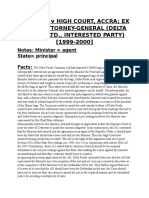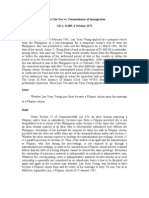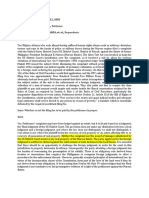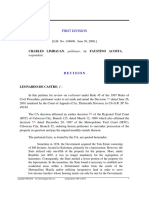Laurel V Garcia
Laurel V Garcia
Uploaded by
Mariano RentomesCopyright:
Available Formats
Laurel V Garcia
Laurel V Garcia
Uploaded by
Mariano RentomesOriginal Description:
Original Title
Copyright
Available Formats
Share this document
Did you find this document useful?
Is this content inappropriate?
Copyright:
Available Formats
Laurel V Garcia
Laurel V Garcia
Uploaded by
Mariano RentomesCopyright:
Available Formats
Laurel v Garcia o The Roppongi property is classified under par. 2 of Art.
420
GR Nos. 92013 & 92047 | JULY 25, 1990 of the Civil Code as property belonging to the State and
Gutierrez, Jr., J. intended for some public service. There can be no doubt
Maniwa | Group 1 that it is of public dominion unless it is convincingly shown
that the property has become patrimonial.
G.R. No. 92013 o The fact that the Roppongi site has not been used for a
PETITONER: Salvador H. Laurel long time for actual Embassy service does not
RESPONDENTS: Ramon Garcia, as head of the Asset Privatization Trust; automatically convert it to patrimonial property. A property
Raul Manglapus, as Secretary of Foreign Affairs; and Catalino Macaraig, as continues to be part of the public domain until there is a
Executive Secretary
formal declaration on the part of the government to
G.R. No. 92047 withdraw it from being such.
PETITIONER: Dionisio S. Ojeda o An abandonment of the intention to use the Roppongi
RESPONDENTS: Executive Secretary Macaraig Jr., Assets Privatization property for public service and to make it patrimonial
Trust Chairman Ramon T. Garcia, Ambassador Ramon Del Rosario, et. al., property under Art. 422 of the Civil Code must be definite.
as members of the Principal and Budding Committees on the Abandonment cannot be inferred from the non-use alone. A
Utilization/Disposition of Philippine Government Properties in Japan mere transfer of the Philippine Embassy to Nampeidai in
1976 is not relinquishment of the Roppongi propertys
TOPIC: Property Classification under the Civil Code By Ownership original purpose.
Private Property 2nd issue: The Roppongi property cannot by alienated
o As property of public dominion, the Roppongi lot is outside
CASE SUMMARY: The President wants to sell an unused property the commerce of man. It cannot be alienated. Its ownership
in Roppongi, Japan, acquired by the Philippine government under the is a special collective ownership for general use and
Reparations Agreement with Japan, intended for use by the enjoyment, an application to the satisfaction of collective
government sector. Petitioners seek to enjoin respondents from needs, and resides in the social group.
proceeding with the bidding for the sale of the Roppongi property. o The purpose is not to serve the State as a juridical person,
but the citizens; it is intended for the common and public
The Court ruled that the Roppongi property is of public dominion and welfare and cannot be the object of appropriation.
not a patrimonial property. As such, it is outside the commerce man 3rd issue: The Executive branch does not have authority to
and it cannot be alienated. The fact that the Roppongi site has not sell the Roppongi property
been used for a long time does not automatically convert it to o Section 63 (c) of RA No. 6657 (Comprehensive Agrarian
patrimonial property. Reform Program or CARP Law) which provides as one of
the sources of funds for its implementation, the proceeds of
FACTS: the disposition of the properties of the Government in
The subject Roppongi property in this case is one of the 4 foreign countries, did not withdraw the Roppongi property
properties in Japan acquired by the Philippine government from being classified as one of public dominion when it
under the Reparations Agreement entered into with Japan, as mentions Philippine properties abroad. Section 63 (c) refers
part of the indemnification to the Filipino people for WW II. to properties which are alienable and not to those reserved
The Roppongi property was acquired on June 27, 1958 for public use or service.
expressly indicated for use by the government sector. It became o RA No. 6657, therefore, does not authorize the Executive
the site of the Philippine Embassy until the latter was transferred Department to sell the Roppongi property. It merely
to Nampeidai on July 22, 1976. The Roppongi property has enumerates possible sources of future funding to augment
remained undeveloped since that time. (as and when needed) the Agrarian Reform Fund created
Amidst opposition by various sectors, the Executive branch has under EO No. 299. Obviously, any property outside of the
been pushing its decision to sell the reparations properties commerce of man cannot be tapped as a source of funds.
starting with the Roppongi lot.
This case is a consolidation of 2 petitions seeking to enjoin DISPOSITIVE:
respondents from proceeding with the bidding for the sale of the WHEREFORE, IN VIEW OF THE FOREGOING, the petitions
3179 sqm land at 306 Roppongi, Tokyo, Japan. are GRANTED. A writ of prohibition is issued enjoining the
respondents from proceeding with the sale of the Roppongi
ISSUES: property in Tokyo, Japan.
WON the Roppongi property is of public dominion or patrimonial
WON the Roppongi property and others of its kind can be
PROVISIONS:
alienated by the Philippine Government
NCC Art. 419. Property is either of public dominion or of private ownership.
WON the Chief Executive, her officers and agents, have the NCC Art. 420. The following things are property of public dominion:
authority and jurisdiction to sell the Roppongi property (1) Those intended for public use, such as roads, canals, rivers, torrents, ports
and bridges constructed by the State, banks, shores, roadsteads, and others of
similar character;
RULING:
(2) Those which belong to the State, without being for public use, and are
1st issue: The Roppongi property is of public dominion intended for some public service or for the development of the national wealth.
o The nature of the Roppongi lot as property for public NCC Art. 421. All other property of the State, which is not of the character stated
service is expressly spelled out. It is dictated by the terms in the preceding article, is patrimonial property.
of the Reparations Agreement and the corresponding NCC Art. 422. Property of public dominion, when no longer intended for public
use or for public service, shall form part of the patrimonial property of the State.
contract of procurement.
You might also like
- Omma Growers ListDocument628 pagesOmma Growers ListThiago Presa100% (1)
- Laurel v. Garcia DigestDocument2 pagesLaurel v. Garcia DigestAbi Bernardino100% (11)
- Laurel v. Garcia, GR No. 92013, 92047Document2 pagesLaurel v. Garcia, GR No. 92013, 92047Amicah100% (4)
- 1001 Books You Must Read Before You Die ListDocument1 page1001 Books You Must Read Before You Die ListMariano Rentomes100% (2)
- Republic V High Court Ex Parte Delta FoodsDocument3 pagesRepublic V High Court Ex Parte Delta FoodsBernard Nii Amaa100% (1)
- Exhibit B-Expert Affidavit CV Case List of Thomas TideringtonDocument17 pagesExhibit B-Expert Affidavit CV Case List of Thomas TideringtonCassidyNo ratings yet
- CASE DIGEST Laurel Vs GarciaDocument2 pagesCASE DIGEST Laurel Vs GarciaErica Dela CruzNo ratings yet
- BOA v. MeralcoDocument2 pagesBOA v. MeralcoMarrielDeTorresNo ratings yet
- Court Decrees and Legal Instruments Affecting MarriageDocument26 pagesCourt Decrees and Legal Instruments Affecting MarriageMariano RentomesNo ratings yet
- Dear Federal Agents by Judge Anna Maria Riezinger (Anna Von Reitz)Document4 pagesDear Federal Agents by Judge Anna Maria Riezinger (Anna Von Reitz)MaxResistance100% (1)
- Form A Fund ManagementDocument88 pagesForm A Fund ManagementAh MhiNo ratings yet
- Laurel v. GarciaDocument1 pageLaurel v. GarciaArbie Dela TorreNo ratings yet
- Laurel V Garcia G.R.no. 92013Document2 pagesLaurel V Garcia G.R.no. 92013Bandar TingaoNo ratings yet
- Laurel vs. GarciaDocument2 pagesLaurel vs. GarciaCharry Castillon100% (1)
- Underhill Vs HernandezDocument2 pagesUnderhill Vs HernandezMaria Cherrylen Castor QuijadaNo ratings yet
- Case Briefs in Alternative Dispute Resolution Set 1Document2 pagesCase Briefs in Alternative Dispute Resolution Set 1Vincent Quiña PigaNo ratings yet
- MEDINA Vs KOIKE DIGESTDocument1 pageMEDINA Vs KOIKE DIGESTAubreyVelascoNo ratings yet
- Secretary of Justice vs. Lantion 343 Scra 377Document1 pageSecretary of Justice vs. Lantion 343 Scra 377Georgette V. SalinasNo ratings yet
- Poe-Llamanzares Vs ComelecDocument7 pagesPoe-Llamanzares Vs Comelecj531823100% (2)
- Pil Case DigestDocument27 pagesPil Case DigestLex Zander BabantoNo ratings yet
- Vinuya vs. Executive SecretaryDocument3 pagesVinuya vs. Executive SecretaryAnneNo ratings yet
- Laurel Vs GarciaDocument1 pageLaurel Vs GarciacyhaaangelaaaNo ratings yet
- Manarang V OfiladaDocument1 pageManarang V OfiladaAnonymous Xhp28mToJNo ratings yet
- SPARK vs. Quezon CityDocument8 pagesSPARK vs. Quezon Cityrobertoii_suarezNo ratings yet
- Williams vs. BruffyDocument4 pagesWilliams vs. BruffyJey RhyNo ratings yet
- Zdigest Perio Santos V MacaraigDocument4 pagesZdigest Perio Santos V MacaraigCindy Ann SilvaNo ratings yet
- Salvacion Vs Central Bank of The Philippines (CB) 278 SCRA 27Document3 pagesSalvacion Vs Central Bank of The Philippines (CB) 278 SCRA 27mondaytuesday17No ratings yet
- VINUYA v. Executive SecretaryDocument3 pagesVINUYA v. Executive SecretaryLizzette Dela Pena100% (1)
- 14 THE LINDEN SUITES, INC, v. MERIDIEN FAR EAST PROPERTIESDocument10 pages14 THE LINDEN SUITES, INC, v. MERIDIEN FAR EAST PROPERTIESAlain AlmarioNo ratings yet
- Noveras Vs NoverasDocument1 pageNoveras Vs NoverasShimi FortunaNo ratings yet
- Constantino Vs Cuisia Digest PDFDocument1 pageConstantino Vs Cuisia Digest PDFSecret SecretNo ratings yet
- Pangilinan V Cayetano PDFDocument2 pagesPangilinan V Cayetano PDFLoren yNo ratings yet
- Compilation of Case Digest (Due Process and Equal Protection of Law)Document43 pagesCompilation of Case Digest (Due Process and Equal Protection of Law)Neil bryan MoninioNo ratings yet
- Raytheon vs. Rouzie, GR 162894 - DetailedDocument3 pagesRaytheon vs. Rouzie, GR 162894 - DetailedIanNo ratings yet
- Adong Vs Cheong Seng GeeDocument2 pagesAdong Vs Cheong Seng GeeSteph Any0% (1)
- Lao Gi Vs CADocument2 pagesLao Gi Vs CARichel DeanNo ratings yet
- Case Brief - Buklod NG Kawaning EIIB Vs ZamoraDocument3 pagesCase Brief - Buklod NG Kawaning EIIB Vs ZamoraJeff SarabusingNo ratings yet
- Mo Ya Lim Vs Commissioner of ImmigrationDocument1 pageMo Ya Lim Vs Commissioner of Immigrationapi-27247349No ratings yet
- Dayrit VS Phil PharmawealthDocument4 pagesDayrit VS Phil PharmawealthcamilledungogNo ratings yet
- Vinuya Vs ESDocument2 pagesVinuya Vs ESAlyanna BarreNo ratings yet
- Pimentel Vs Executive Secretary Case DigestDocument2 pagesPimentel Vs Executive Secretary Case Digestcristine jagodillaNo ratings yet
- PIL Case Digest JD 2CDocument84 pagesPIL Case Digest JD 2CAnonymous Lu6MrQm100% (4)
- Gerbert Corpuz Vs Daisylyn Tirol StoDocument2 pagesGerbert Corpuz Vs Daisylyn Tirol StoopislotoNo ratings yet
- Property ReviewerDocument3 pagesProperty Reviewerbonix100% (1)
- Reyes V DiazDocument2 pagesReyes V DiazRolando Mauring ReubalNo ratings yet
- Saudia V Rebesencio (GR No 198587) DigestDocument1 pageSaudia V Rebesencio (GR No 198587) DigestJose Ramon Ampil67% (3)
- Tan Se Chiong vs. Director of PrisonersDocument4 pagesTan Se Chiong vs. Director of PrisonersCases M7No ratings yet
- Digest Vinuya v. RomuloDocument1 pageDigest Vinuya v. RomuloCamille BugtasNo ratings yet
- Digest - Rule 139 BDocument7 pagesDigest - Rule 139 BKristine Salvador CayetanoNo ratings yet
- Adong v. Cheong Seng GeeDocument3 pagesAdong v. Cheong Seng GeeGR100% (2)
- Corfu Channel Case DigestDocument2 pagesCorfu Channel Case Digestcarl dianneNo ratings yet
- Article 1156 1254 Civil ObliDocument5 pagesArticle 1156 1254 Civil ObliMitchi BarrancoNo ratings yet
- Ching v. NicdaoDocument1 pageChing v. NicdaoReymart-Vin MagulianoNo ratings yet
- Roehr V RodriguezDocument3 pagesRoehr V RodriguezRR FNo ratings yet
- CASE DIGEST Lopez Vs OrosaDocument1 pageCASE DIGEST Lopez Vs OrosaErica Dela Cruz100% (1)
- Consti 1 Session 4 Case DigestsDocument8 pagesConsti 1 Session 4 Case DigestsAlan Jay CariñoNo ratings yet
- Information Technology Foundation of The Philippines Vs COMELEC Final DraftDocument2 pagesInformation Technology Foundation of The Philippines Vs COMELEC Final DraftJoannMarieBrenda delaGenteNo ratings yet
- Alma Jose vs. JavellanaDocument8 pagesAlma Jose vs. JavellanaMatthew TurnerNo ratings yet
- 11 Funa V MecoDocument2 pages11 Funa V MecoAnonymous fnlSh4KHIg100% (2)
- Mijares Vs Ranada - Case DigestDocument1 pageMijares Vs Ranada - Case DigestOM Molins100% (2)
- South West Africa CasesDocument1 pageSouth West Africa Casesgem_mataNo ratings yet
- Who Vs AquinoDocument2 pagesWho Vs AquinonoaimahNo ratings yet
- Digest - (4th Batch) Adong vs. Cheong Seng GeeDocument20 pagesDigest - (4th Batch) Adong vs. Cheong Seng GeeCarlo Troy Acelott100% (2)
- 6 - Bank of America Vs American Realty CorporationDocument2 pages6 - Bank of America Vs American Realty CorporationNikki Estores Gonzales100% (1)
- 09 - Laurel v. Garcia - LiaoDocument2 pages09 - Laurel v. Garcia - LiaoRalph Deric EspirituNo ratings yet
- Laurel Vs GarciaDocument3 pagesLaurel Vs GarciaBeatrice AbanNo ratings yet
- Laurel V GarciaDocument29 pagesLaurel V GarciaCarrie Anne GarciaNo ratings yet
- Tumalad V VicencioDocument1 pageTumalad V VicencioMariano RentomesNo ratings yet
- Cebu Oxygen v. BercillesDocument1 pageCebu Oxygen v. BercillesMariano RentomesNo ratings yet
- Philippine Policy Towards Regional Cooperation in Southeast AsiaDocument450 pagesPhilippine Policy Towards Regional Cooperation in Southeast AsiaMariano RentomesNo ratings yet
- Begino V ABS-CBN CorporationDocument2 pagesBegino V ABS-CBN CorporationMariano RentomesNo ratings yet
- Benguet Corp. V CBAADocument1 pageBenguet Corp. V CBAAMariano RentomesNo ratings yet
- Galope v. Bugarin Decision Full TextDocument9 pagesGalope v. Bugarin Decision Full TextMariano RentomesNo ratings yet
- Usero V CADocument1 pageUsero V CAMariano Rentomes100% (1)
- Limbauan v. Acosta Decision Full TextDocument14 pagesLimbauan v. Acosta Decision Full TextMariano RentomesNo ratings yet
- RP v. Olaybar Decision Full TextDocument7 pagesRP v. Olaybar Decision Full TextMariano RentomesNo ratings yet
- Meralco Securities Industrial Corp. v. CBAADocument2 pagesMeralco Securities Industrial Corp. v. CBAAMariano RentomesNo ratings yet
- Davao Saw Mill v. CastilloDocument1 pageDavao Saw Mill v. CastilloMariano RentomesNo ratings yet
- Sinon v. CSC DigestDocument2 pagesSinon v. CSC DigestMariano Rentomes100% (1)
- Rodriguez v. Salvador Decision Full TextDocument10 pagesRodriguez v. Salvador Decision Full TextMariano RentomesNo ratings yet
- AUP Price List Year-End Sale 2016Document13 pagesAUP Price List Year-End Sale 2016Mariano RentomesNo ratings yet
- Civil Registry ProceduresDocument17 pagesCivil Registry ProceduresmasterfollowNo ratings yet
- PP 843 s.1971Document4 pagesPP 843 s.1971Mariano RentomesNo ratings yet
- Benchbook in Special ProceedingsDocument74 pagesBenchbook in Special ProceedingsMariano Rentomes100% (2)
- Syllabus On The Law of AgencyDocument4 pagesSyllabus On The Law of AgencyMariano RentomesNo ratings yet
- Dream of The Red Chamber Book 2Document385 pagesDream of The Red Chamber Book 2Mariano RentomesNo ratings yet
- People v. Jorolan DigestDocument3 pagesPeople v. Jorolan DigestMariano RentomesNo ratings yet
- Luego V CSC DigestDocument2 pagesLuego V CSC DigestMariano Rentomes100% (2)
- Erasmo v. Home InsuranceDocument2 pagesErasmo v. Home InsuranceMariano RentomesNo ratings yet
- People V Bates DigestDocument2 pagesPeople V Bates DigestMariano Rentomes100% (2)
- Cantimbuhan v. CADocument4 pagesCantimbuhan v. CAMariano RentomesNo ratings yet
- Dela Cruz v. COA DigestDocument2 pagesDela Cruz v. COA DigestMariano Rentomes100% (1)
- La Suerte v. CTADocument3 pagesLa Suerte v. CTAMariano Rentomes100% (1)
- Villegas v. Hiu ChiongDocument3 pagesVillegas v. Hiu ChiongMariano RentomesNo ratings yet
- Henderson v. CIRDocument5 pagesHenderson v. CIRMariano RentomesNo ratings yet
- MTRCB v. ABS-CBN (2005)Document9 pagesMTRCB v. ABS-CBN (2005)enggNo ratings yet
- Analysisof Consumer Protection Act 2019Document8 pagesAnalysisof Consumer Protection Act 2019project mailNo ratings yet
- Indian Constitution GK MCQDocument16 pagesIndian Constitution GK MCQMasterNo ratings yet
- West Tower Condo V FPICDocument18 pagesWest Tower Condo V FPICAl Mayo PaglinawanNo ratings yet
- Explanation Letter - Dismissal of Criminal CaseDocument5 pagesExplanation Letter - Dismissal of Criminal CaseSteps RolsNo ratings yet
- Compulsory Retirement Under The Law of ServicesDocument13 pagesCompulsory Retirement Under The Law of Serviceslexnotas24No ratings yet
- Individual Personal Accident Policy Claim FormDocument4 pagesIndividual Personal Accident Policy Claim FormKapa VivekNo ratings yet
- G.R. No. 88919 July 25, 1990 People v. Judge IntingDocument2 pagesG.R. No. 88919 July 25, 1990 People v. Judge IntingApril Joy OmboyNo ratings yet
- Notice To Barangay Captains - v2Document5 pagesNotice To Barangay Captains - v2Efren VillamorNo ratings yet
- Ignoring Child Porn LawsDocument3 pagesIgnoring Child Porn LawsIyavar Chetty100% (1)
- Macn+r000130752 - Empire State Ov Morocco Unniversall Sovereigne OrigeneallDocument3 pagesMacn+r000130752 - Empire State Ov Morocco Unniversall Sovereigne Origenealltheodore moses antoine beyNo ratings yet
- Copyreading and Headline Writing Exercise 3 KeyDocument4 pagesCopyreading and Headline Writing Exercise 3 KeyPaul Marcine C. DayogNo ratings yet
- Ap Us Governemnt VocabularyDocument30 pagesAp Us Governemnt Vocabularyapi-297702416No ratings yet
- Adjustment Challan-Helical SpringsDocument2 pagesAdjustment Challan-Helical Springstippanna Devidas nikambeNo ratings yet
- Disqualification by Reason of MarriageDocument3 pagesDisqualification by Reason of MarriageMei Dabalos CuntapayNo ratings yet
- Complete SyllabusDocument70 pagesComplete SyllabuspchakrNo ratings yet
- People v. Plasencia y DesamparadoDocument10 pagesPeople v. Plasencia y DesamparadoJill BetiaNo ratings yet
- The Effects of Drug War-Related Violence On Mexico's Press and DemocracyDocument43 pagesThe Effects of Drug War-Related Violence On Mexico's Press and DemocracyThe Wilson CenterNo ratings yet
- An Analysis of The Maxim: Rex Non Potest Peccare: Legal LanguageDocument16 pagesAn Analysis of The Maxim: Rex Non Potest Peccare: Legal LanguageDr Racchana D FadiaNo ratings yet
- Jural RelationsDocument2 pagesJural Relationsmona5472.mnNo ratings yet
- Format For Cancellation of BailDocument8 pagesFormat For Cancellation of BailAnujNo ratings yet
- Police Calls To Bill Reed Middle SchoolDocument2 pagesPolice Calls To Bill Reed Middle SchoolTimesCallNo ratings yet
- Grotius - On The Law of War and Peace (2012)Document19 pagesGrotius - On The Law of War and Peace (2012)Fleur IJpelaarNo ratings yet
- Ordinance of Speed Limit Ordinance No. 3Document5 pagesOrdinance of Speed Limit Ordinance No. 3Francis Danver Emerz100% (1)
- G.R. No. 160071, June 06, 2016 - ANDREW D. FYFEDocument8 pagesG.R. No. 160071, June 06, 2016 - ANDREW D. FYFELeizle Funa-FernandezNo ratings yet























































































































